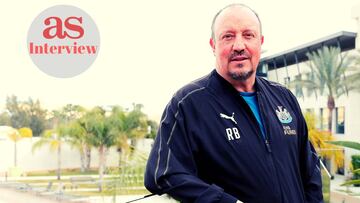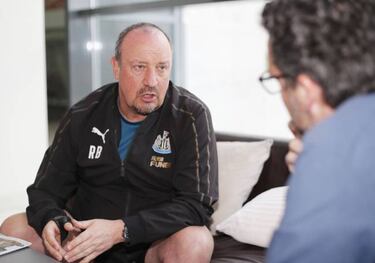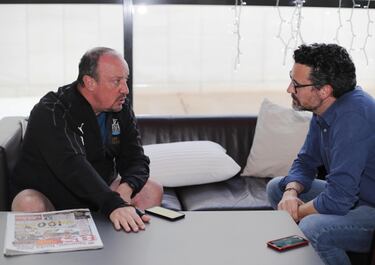Rafa Benítez: "If you win titles in Spain, England and Italy..."
His face changed from talk of Valencia, Liverpool and Napoli, to that of Real Madrid, as we got an insight into the mind of the Spaniard at the Hotel La Finca, Alicante.

Former Valencia, Liverpool, Real Madrid and Napoli manager Rafa Benítez sat down with AS to discuss his past, present, and future. Enjoy what the current Newcastle United manager has to say...
What remains of the Rafa Benítez who coached Castilla?
A lot of things: the enthusiasm, the desire to win games and titles. The difference is in the level of experience, which helps you to make fewer mistakes.
Do coaches have a best-before date?
Not if you continue to adapt, no. The key is to have a young, dynamic backroom staff that is up to speed and that keeps you up to speed. My daughters show me how to use Instagram and all the rest of the social media. You have to be up to date. We have the most sophisticated software there is. But then your experience is what helps you make decisions. We all have access to the information and the data, but you have to know how to interpret it all.
How has football changed?
Above all in terms of its social repercussions. The press, social media… what seems to be the most important thing in the world one day is forgotten the next. You have to have a different perspective; you can’t let yourself get concerned or worried because everything changes within two or three days. It’s more important to have a methodology, a way of carrying out your work, and to stick to those methods for a period of time, despite the knowledge that you might be mistaken, but your experience allows you to perform your analysis more effectively and make fewer mistakes.
Have footballers also changed?
Of course; technology and social media have changed everything. I have a photo from when I was at Napoli of 14 footballers in an airport, all of them on their phones and not saying a word to each other. When we won the league with Valencia, the players would chat about football for half an hour after every meal, they would watch games together and they knew everything about the other teams in the division. That has changed now and you have to know how to focus your players.
Mauricio Pellegrino, Rubén Baraja, Mista, Curro Torres... many of your former players are now coaches.
One of the things you study when you’re doing a degree in Physical Education is methodology: how to teach. You can do it in several ways like guided discovery, which is designed to solve problems. Or you can use direct commands, saying what needs and be done and leaving it at that. When you ask players how to solve problems and they give you answers, you are asking them to think and making them better players. And if those players think more and more, they end up being coaches. However, there are coaches who prefer the method of sitting their players down and telling them what to do. I like it more when the players look for solutions themselves.
Some people have you pigeonholed as an overly meticulous manager. Does that bother you?
I see being meticulous as a positive. It depends on the squad of players you have and the best way to take them forward. But at the end of the day they all want the same thing: to win. In order to do that, you have to be meticulous. Of course there are people who enjoy a bit of luck, who pick the team while the players sort things out themselves on the pitch. But that isn’t the way. The answer is to do your job well and get the best out of the players you have. Sometimes that will be by paying more attention to detail and sometimes by allowing them more freedom. It all depends on the player and you have to assess them.

In other words, “manage egos…”
You could say that. Every player is different, they have their moments and you have yours. But despite what people might think, we haven’t had that many problems in the dressing room. The thing is that there are players who fit in better than others. Normally, with intelligent players, who you can provide with things that they then take on board, we don’t have any issues. Obviously there are some that you come to be at odds with, because every player is a different character. But if we have won titles in Spain, Italy and England we must be doing something right.
Why did your methods not work at Inter and Real Madrid?
I don’t agree that they didn’t. At Inter we won two titles [the Supercoppa Italiana and the Club World Cup in 2010] and without any of the signings we’d been promised. We only got [Philippe] Coutinho in, and he was just a kid then. At Real Madrid we were where we needed to be at that stage of the season: we’d qualified for the last 16 of the Champions League, we were two points behind Barcelona, who had a game in hand, and four behind Atlético. It’s not a problem of us not winning, we win, but sometimes people don’t let you win.
What was the problem at Real Madrid then?
There wasn’t one because now I am focused on Newcastle.
There must have been when you left the club…
I’m concentrating on what’s ahead of me, not on what is in the past.
We talked about egos before: do you regret placing Gareth Bale on the same level as Cristiano Ronaldo?
I’m so focused on Newcastle that I don’t even remember that.
Why don’t you want to talk about your time at Real Madrid?
Whatever I say about Real Madrid, there will always be someone who will take my words out of context.
Would you coach in Spain again?
Yes, but my family is based in England and that was my priority when I went back to the Premier League.
Why did you choose Newcastle?
What I wanted when I went back was to have a team that could be competitive. The teams higher up the table all had managers. Then this possibility came up, at a historic English side that was going through a bad spell on the pitch. Unfortunately when we arrived there were a lot of injuries and very little time. We couldn’t keep the team up. But we took a risk, which was to stay and take Newcastle back up from the Championship and then to put together a competitive side to challenge for the top eight… that was the idea.
The idea?
After winning the Championship and getting promoted, the level of investment [in the squad] wasn’t what I had hoped it would be and that’s why we haven’t been able to close the gap on those teams above us.
Your contract is up at the end of the season. Have you made any kind of decision?
I don’t want the fans or the players to waste any time thinking about that. The main thing is to make sure we stay up and then we’ll talk about projects.
What motivates you?
I’m talking about an ambitious project for the future with the possibility, at the level that you are at, of competing and winning. When you have won titles you want to carry on fighting for that goal. I enjoy my job, my people take care of the technology very well and we want to get back to competing for titles if possible.
How would you describe the perfect model for a project at a club?
It depends mainly on those in the boardroom, on how those that make the decisions allow the professionals to do their job. In that respect, every club is different. All of the teams that are successful have a stamp of identity or a way of doing things. Almost without exception success comes from hard work, but sometimes luck plays its part or the skill of individual players makes the difference. But when someone wins in three different countries, with different cultures and standpoints, it means that they’re doing something right.
Is it possible to transfer the idea of a manager to Spain?
It’s difficult in Spain and it’s becoming more and more difficult in England. It depends on the owner. They have to decide what sort of structure they want, if they want a coach who just puts the players out on the pitch or a coach who wants to help to have a professional structure. On the basis of that, the manager either has more or less room for influence.

When you decide to call it a day, what would you like to be remembered for?
For being methodical, a hard worker… I’d like people to remember Valencia, Liverpool, and even Napoli… what actually surprises me is that people still say we play defensive football.
Why does that surprise you?
Our key is balance. Our teams defend well and attack well. The evidence is there in the statistics. When we won our first league title with Valencia we scored one goal fewer than Real Madrid and we hold the record for the biggest Champions League victory in history [8-0 against Besiktas with Liverpool]. I remember when we were at Liverpool we beat Manchester United 4-1, Real Madrid 4-0 and Aston Villa 5-0 in eight days. When you have a team that can attack, you attack, and when you have to defend, you defend. It’s that balance that allows you to win titles.
How long do you see yourself coaching for?
For another 10 years at least. And mostly in England, where you can work as a manager. The main thing is to have energy and enthusiasm, and I have both.
What does the Premier League have that LaLiga doesn't?
The key thing is the TV rights [deal], which brings in a lot more money. That puts you in a position to sign players, and the more quality you have, the more names you have, the more you can sell the product.
What's your opinion on VAR?
As I said a few weeks ago, the way football is nowadays, with the speed it's played at and the importance of every decision, VAR is necessary. How to manage the system is another matter, of course, because depending on that it'll get more or less criticism, and will be applied more or less effectively. But technology is definitely needed to lend [match officials] a hand, because there's so much at stake in every game.
You were one of the first Spaniards to arrive in the Premier League.
When we arrived in the Premier League, there were no Spaniards. We brought Spanish footballers over, and we also paved the way for other well-qualified Spanish coaches. Spaniards have established a real foothold in the Premier League because they've been successful. We've won trophies, and so have other colleagues [from Spain], and that makes people sit up and take notice and feel that Spanish is the way to go. That speaks volumes for the way Spanish players and coaches work, the way we approach the game.
What are your thoughts on how Pep Guardiola is getting on at Manchester City?
Pep is a great coach and he has a great team. City are investing to go right to the very top.
And what about Unai Emery at Arsenal?
Unai has gone to a club that needed to change things, and he's making progress bit by bit. Let's see how far he can go. He's a guy with a fantastic work ethic.
He isn't Spanish, but there's a lot of talk about him in Spain. What's your opinion on the strides that Mauricio Pochettino has made at Tottenham Hotspur?
He's at a good club and he's doing very well. He's one of the most highly rated coaches in England. That's a sure-fire sign that he's been getting results consistently and over a prolonged period of time; that he hasn't just had a good year.
Are Valencia and Liverpool special clubs for you?
Yes, of course. We had some great times at Valencia, and my links to Liverpool go back many years. My family lives there. But there's also something special about Extremadura, Tenerife, Napoli... Whenever you've done something and it's been a success, you remember it fondly. Valencia and Liverpool are naturally very special.
If you could relive a particular moment in your career, which would it be?
It wouldn't be fair to focus on just one. A lot of people would talk about Istanbul, but there were a number of memorable experiences on the way to getting there, too. I remember the game against Juventus, when we had to change our approach to be able to beat a fantastic side. Istanbul is of course an unforgettable moment, though, because of how it happened. Winning the Coppa Italia with Napoli was also a wonderful feeling, as was lifting the Club World Cup with Inter Milan, and LaLiga and the UEFA Cup at Valencia.
What happened at half time in Istanbul?
One thing that people don't always appreciate is that coaching in your own country isn't the same as doing so abroad. The language is a really tricky hurdle to overcome. We've had success in England, in Spain and in Italy, so that shows something. And we've had success in top and second-tier football. When you go to another country and find yourself 3-0 down against AC Milan, who were a terrific side, it's tough to convey to your players, in English, what you're feeling and the adjustments that you want them to make. For those goals to happen, you have to be able to put your ideas across once you've got to the final. After all, I see a lot of coaches who give their press conferences with an interpreter by their side. For me, that was something that meant a lot, and shows what your backroom team is made of; that it has the tools to succeed and can compete with anyone as long as we have the means.
And which trophy meant the most to you at Valencia?
Related stories
The first LaLiga title - and the UEFA Cup, too, because playing a one-off match with silverware at stake is different to anything else. But the first LaLiga title wasn't easy. When we won our second, it was a stronger team that was more used to that kind of pressure. When we lifted the first title, we were eight points behind Real Madrid in January - although we felt confident that we could win the championship.
In January?
I said to [goalkeeper Santi] Cañizares and a couple of other players that we could win the title. Because I knew how we worked and I knew how our rivals worked, basing their approach on the quality of their players. That consistency, that stability that we had, was going to help us win a lot of games. The Mestalla crowd also helped us a lot; they really spurred us on in key matches.
